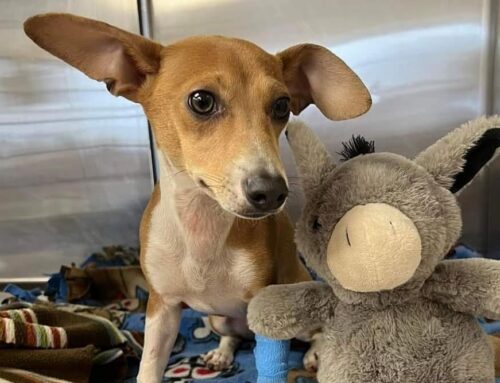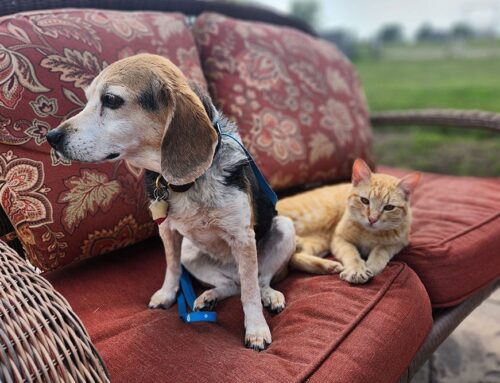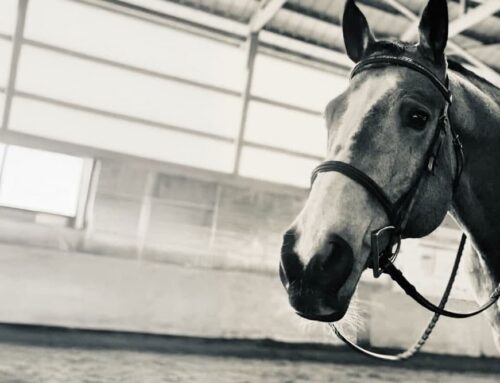Nothing brings a smile to your face like watching your dog play outside. Whether they’re happily splashing in a creek, rolling around in the grass, or exploring their world with their nose, their pure, innocent joy is contagious. However, your pet likely is not alone outdoors—they may have lots of company, commonly in the form of tiny intestinal parasites that cause tummy trouble—or worse—when ingested. One common intestinal parasite, Giardia, is spread through the feces of infected animals and easily spreads among dogs. Our team at Red Oak Animal Hospital provides the information you need to prevent, identify, and manage Giardia in dogs.
What is Giardia in dogs?
Giardia is a microscopic parasite that is shed in cysts through an infected animal’s feces, and can invade the intestines and cause an infection known as giardiasis. Giardia cysts can survive in the environment in the infected animal’s feces for long periods and be transmitted to healthy pets. Common ways dogs become infected include:
- Swimming and playing in contaminated water (e.g., streams, ponds, lakes)
- Drinking from a contaminated communal water bowl
- Sniffing the dirt or feces that contain the parasite
- Sniffing another dog’s hind end
- Licking their body after contact with a contaminated area
What are Giardia signs in dogs?
Many dogs infected with Giardia do not show signs, but may still carry and spread the infection to other animals. Young dogs and dogs with weakened immune systems are most likely to suffer gastrointestinal (GI) upset, including watery, foul-smelling, diarrhea with mucus, as well as the following signs:
- Vomiting
- Excessive gas
- Appetite loss
- Weight loss
- Lethargy
Many Giardia signs can indicate other health conditions as well as digestive issues, but your veterinarian can examine your pet and perform diagnostic testing to determine the exact cause and recommend appropriate treatment.
How is Giardia diagnosed in dogs?
To diagnose giardiasis, your veterinarian will need a fecal sample, although Giardia cysts can be shed intermittently in the stool and may not appear on a single stool sample. Therefore, your veterinarian may require multiple fecal samples over several days to confirm the parasite’s presence and make an accurate diagnosis.
How is Giardia treated in dogs?
The treatment goal is to resolve the diarrhea, so dogs without symptoms may not require treatment. giardiasis treatment typically involves a course of deworming medications and antibiotics to eradicate the parasite and clear up diarrhea, plus additional medications, rehydration fluids, and nutritional support, depending on infection severity and your dog’s condition. Dogs can become reinfected if their surrounding environment is not properly managed, so you should take the following measures to reduce your pet’s reinfection risk:
- Bathing — Bathe your dog regularly during giardiasis treatment to remove cysts in their coat. Trimming your dog’s fur around their hind end can help keep them clean and prevent cysts from clinging to the fur.
- Waste disposal — Dispose of your pet’s feces promptly to avoid exposing other animals to the parasites.
- Disinfecting — Disinfect your pet’s environment, including bedding, flooring, toys, and food and water bowls.
- Recheck — Retest your pet two to four weeks following treatment to ensure their infection has cleared.
Can my dog give me Giardia?
While Giardia is zoonotic (i.e., the disease can be transmitted from an infected animal to a human), the chances of people getting giardiasis from dogs are low. Most people contract the infection when they drink contaminated water. Regardless, good hygiene is always important to minimize disease and parasite transmission.
If your dog is diagnosed with Giardia, help prevent disease spread by always:
- Wearing gloves when handling their feces
- Washing your hands frequently
- Keeping your dog clean with regular baths
- Disinfecting your environment frequently
How can I protect my dog from Giardia?
While Giardia is rarely fatal except in very young or very old immunocompromised dogs, the disease can make your dog sick and uncomfortable. Use these tips to reduce your dog’s Giardia infection risk:
- Ensure your pet always has access to clean, fresh water.
- Don’t allow your pet to drink from natural water sources or random water bowls left on the sidewalk.
- Don’t let your pet sniff other animals’ feces.
- Don’t let your pet eat small mammals.
- Dispose of your pet’s feces immediately and appropriately.
- Schedule an annual wellness examination, including fecal parasite testing, to detect hidden illnesses or infections early, and help ensure your dog’s good health.
If your dog develops diarrhea that does not clear up in 48 hours, schedule an appointment with our Red Oak Animal Hospital team to determine if Giardia is the cause. In addition, schedule your pet’s annual wellness screening exam to find possible parasitic infections early.










Leave A Comment